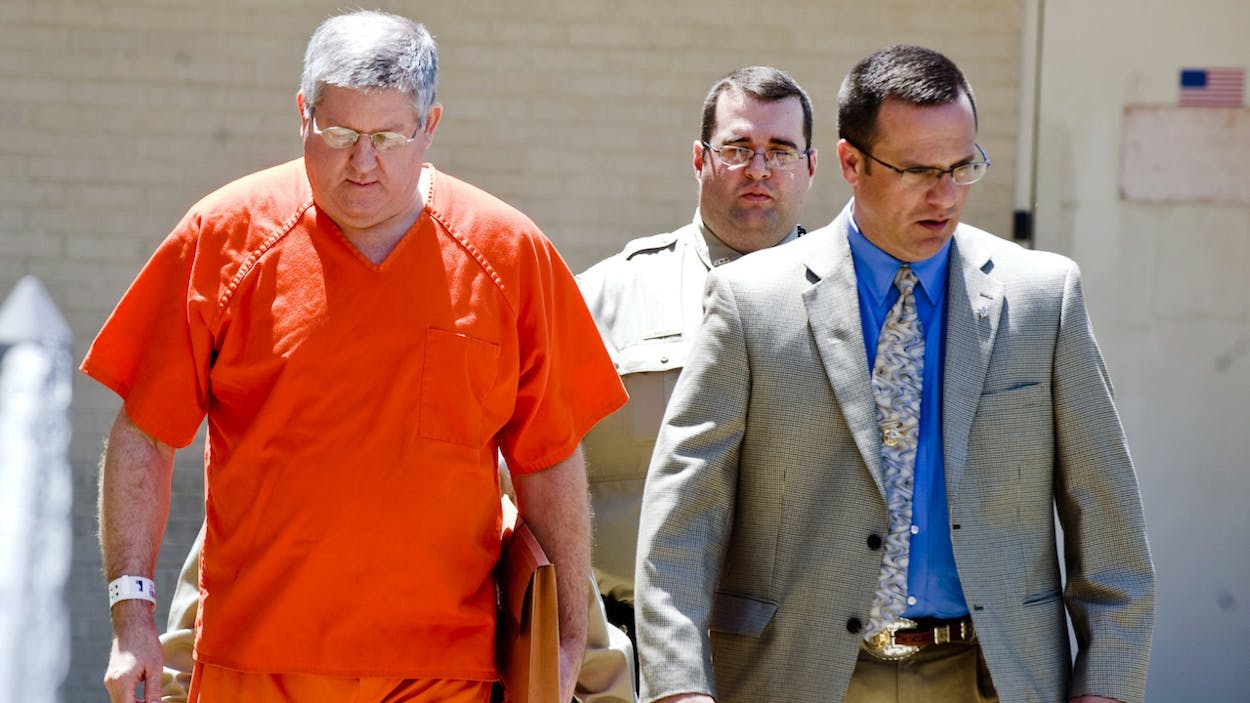The story of Bernie Tiede has been well-told. (First by our own Skip Hollandsworth, then by Richard Linklater, and in the years since by news outlets around the country.) Tiede, who was played with uncharacteristically subtle charm by Jack Black in Linklater’s film, Bernie, was convicted in the 1996 murder of an 81-year-old Carthage widow. But he’s been out of prison for more than a year now, after a lawyer—who got involved with the case after watching the movie—discovered evidence that would have likely resulted in a lesser charge against Tiede that was withheld during the trial.
Tiede’s not a free man, though. In a curious move, a judge agreed that Tiede could be released awaiting a new sentencing trial on the condition that he live with Linklater. And now that the new trial is scheduled to take place in April, Linklater—along with Black and Matthew McConaughey, who co-starred in the film—is hosting a fundraiser to pay for Tiede’s legal defense.
The fact that three very rich men are raising money to pay for the defense of a confessed, convicted murderer has attracted some criticism:
Yeah, I'm not sympathetic. Bernie shot an old lady in the back, stuffed her in a freezer, & stole her money. https://t.co/TlsS9zDddM
— Sarah Rumpf (@rumpfshaker) December 22, 2015
I'm a little distrubed by this. https://t.co/6Tjorcz5uQ #Bernie #BernieTiede
— Gabe Crawford (@gabecrawford) December 21, 2015
In whole world of important criminal justice causes, white dudes raise money for lovable white dude murderer https://t.co/SGwN6HxWRs
— Andrea Grimes (@andreagrimes) December 21, 2015
@McConaughey Why are you holding a fundraiser for Bernie Tiede? He shot a grandma in the back 4x, took her $ and stuffed her in a freezer.
— Jay Legend (@JayBelize23) December 22, 2015
The criticism is understandable, certainly—the fact that Tiede is something of a celebrity because a movie was made about him doesn’t change what he did, and it’s always curious to see what causes rich and powerful people choose to support.
At the same time, though, it’s also true that mitigating evidence that even the prosecutor in the case, Danny Buck, admitted would have led him to seek a lesser charge against Tiede, was withheld during the initial trial. Tiede may not have been wrongfully convicted of murder, but he was perhaps wrongfully charged with first-degree murder, instead of second degree—and given that both Buck and the judge in the case have recognized that fact, Tiede is entitled to a defense.
So though there are causes that are more sympathetic than the legal defense of a convicted murderer who’s about to receive a new sentencing trial, there is a valid legal issue here.
Additionally, the high profile of Linklater, McConaughey, and Black means that this fundraiser is getting a disproportionate amount of attention, but it doesn’t appear that any of the hosts sought that publicity: News of the event spread after the Texas Tribune published a story this week that described the fundraiser as “uber-private” and “exclusive,” and explained that the website obtained a copy of the invitation—the trio aren’t crowd-funding Tiede’s defense, they’re sending out select invitations, and no press release was issued.
Which means that what’s happening here isn’t all that different from how criminal defense in this country works for anyone who is lucky enough to have friends or family with the means to offer support. Criminal defense lawyers are expensive, and few defendants have the same resources as the prosecutors seeking convictions. That a wealthy guy like Linklater is asking his wealthy friends to chip in money to ensure as strong a defense as possible for the guy who lives in his garage isn’t really news, except that all of the names involved—Linklater, McConaughey, Black, and Tiede—belong to famous people.
Generally, anytime people who are very wealthy attempt to raise money for a cause that isn’t an obvious charity or political issue, it raises some eyebrows. When they ask the general public to pay for things for which they’ll reap all the financial rewards—say, when a successful Hollywood personality takes to Kickstarter to make a movie—those eyebrows can jump an extra half-inch or so. That’s a reasonable suspicion, but there are no rewards for Linklater beyond the possibility that Tiede’s new trial will reflect that, had the evidence that was uncovered after the movie was released been made available to his defense during the original trial, he’d have been charged as someone who was responding to a trauma, and would have received a 20 year sentence instead of life.
All of which is to say that while suspicion of the fundraiser—or a lack of sympathy for Tiede—are reasonable things, not much is actually inappropriate here. There was a valid legal with Tiede’s initial conviction; criminal defense is expensive; and the fundraiser is soliciting money from private donors invited by Linklater, Black, and McConaughey personally. If a bunch of rich guys want to ask their rich friends to help pay for better lawyers for their buddy, it’s hard to see why that matters to anybody else.








